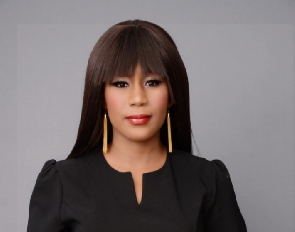- Home - News
- TWI News | TV
- Polls
- Year In Review
- News Archive
- Crime & Punishment
- Politics
- Regional
- Editorial
- Health
- Ghanaians Abroad
- Tabloid
- Africa
- Religion
- Election 2020
- Coronavirus
- News Videos | TV
- Photo Archives
- News Headlines
- Press Release
Opinions of Friday, 26 February 2021
Columnist: Amanda Clinton
Why Ghana's legal framework is in the dark ages: The financial clean-up that just didn't touch the unregulated and illegal sector
1. Government institutions in Ghana are simply not accountable for failures to the public even when those failures affect the mass public. They are not accountable in a rigorous public enquiry or in our courts who tend to shield them.
2. However legal institutions that promote accountability and transparency, and curb corruption can facilitate development. Consistent and fair regulation and dispute resolution facilitates the smooth operation of the market system, and reduces the opportunities for corruption, nepotism and rent seeking. The rule of law can also promote sustainable development by enshrining social rights in constitutions and legislation.
3. Neopatrimonialism on the other hand allows one individual to access the higher echelons of government for a fee and political will in turn directs heads of departments not to get involved in shutting down that individual's business for an unusually prolonged period of time even if it affects the general public.
4. When the fall out happens (millions of Ghanaian citizens having lost millions of dollars because of the failure of e. g Bank of Ghana, Economic and Organized Crime Office, Security and Exchange Commission and Attorney General's department to coordinate and shut down illegal entities especially when the general public is involved), these institutions face no consequences internal or otherwise and are shielded by the courts who work in tangent with political will.
5. We know government is capable of intervening in the public interest because they have done so for e.g. Football (ex parte injunctions to shut down GFA in the public interest) and shutting down LGBT offices under the guise that public morality has been offended.
6. In the financial sector however, the big financial cleanup has ironically not lead to the most obvious cleanup of all-a way of closing the doors to illegal financial entities at first instance before mass public financial loss occurs despite the machinery in place to do so.
7. One will often find EOCO, Bank of Ghana, SEC and AG representatives filing to court to defend their integrity as institutions but rarely will you find these same representatives sitting around a table week on end on how to protect the public from rampant Ponzi schemes before mass financial loss occurs. Nor will you find them pulling resources and ideas on how to send financial criminals to jail and send a message locally and internationally that the unregulated financial sector is not the place to make your millions and stay out of jail plotting to be the next president of Ghana. Instead, regulators couch behind how their regulations just didn't go far enough to enforce the shutting down of illegal 419 institutions when they could have just walked to the Attorney General's department and made a case for why an ex parte injunction should have been sought in the public interest.
8. Our legal framework at present favors white collar criminals. For a criminal to pay the fee to become regulated by e.g. SEC would be ludicurious because as we found in the MenzGold case, one can make more money unregulated and illegal and still face no jail time and millions of dollars to spare with no quick and widespread culling of assets by government or repercussions to that individual.
9. In UAE recently, a Nigerian white collar criminal was arrested and expelled from the UAE and not to his country of Nigeria but the United States. He was the famous Hushpuppy, an Instagram celebrity. UAE's act of expulsion was illegal because Hushpuppy should have been expelled home. What the UAE and US governments knew however was the truth! A dollar millionaire criminal would be able to talk and pay his way out of being held accountable the second he stepped foot on African soil. Justice therefore needed a region that would enforce the sanctity of the rule of law and equity with law enforcement, regulators and the judiciary working together to ensure justice prevails.
10. Ghana is fast developing a reputation for our institutions finding solace in the courts (that they have indeed maintained their integrity as institutions) even if that is far from the truth. Ghana is also developing a reputation for money laundering with monies layered and integrated in illegal and unregulated financial institutions that are Ponzi schemes.
11. Institutions who fail millions of Ghanaians by allowing criminals to over time cause financial bloodbaths that could have been stemmed earlier, face no rigorous public enquiry, cross examination, removal of heads of departments ( if necessary) and consequences publicly or otherwise for failure to act. How can they face consequences if the higher echelons of those institutions are simply acting in accordance with instructions from political will?
12. Although our institutions have no incentive to protect the mass public when it comes to the unregulated and illegal financial sector, it is hoped that the loss of reputation both locally and internationally of the institutions mentioned throughout this paper, will be enough for them to act in the public interest in future. Otherwise, we are inviting criminals to duplicate the 'success' of the Nam1 story and sending a message that indeed Ghana is the Number 1 destination for white collar criminals to face no jail time, keep the money gained from crime and ironically have the regulators not pursue the criminal but protect them and defend their supposed integrity in courts of law.
13. An effective legal and judicial system is an essential component for economic development, as it is for human development and basic civil liberties. Ensuring that decision making and justice are not determined by individual favours or corruption and that all citizens have equal access to the rule of law is vital to overcoming inequality and social exclusion. It is also required for the creation of transparent and well-functioning financial and other markets. Hopefully our institutions in Ghana will get the memo soon.











